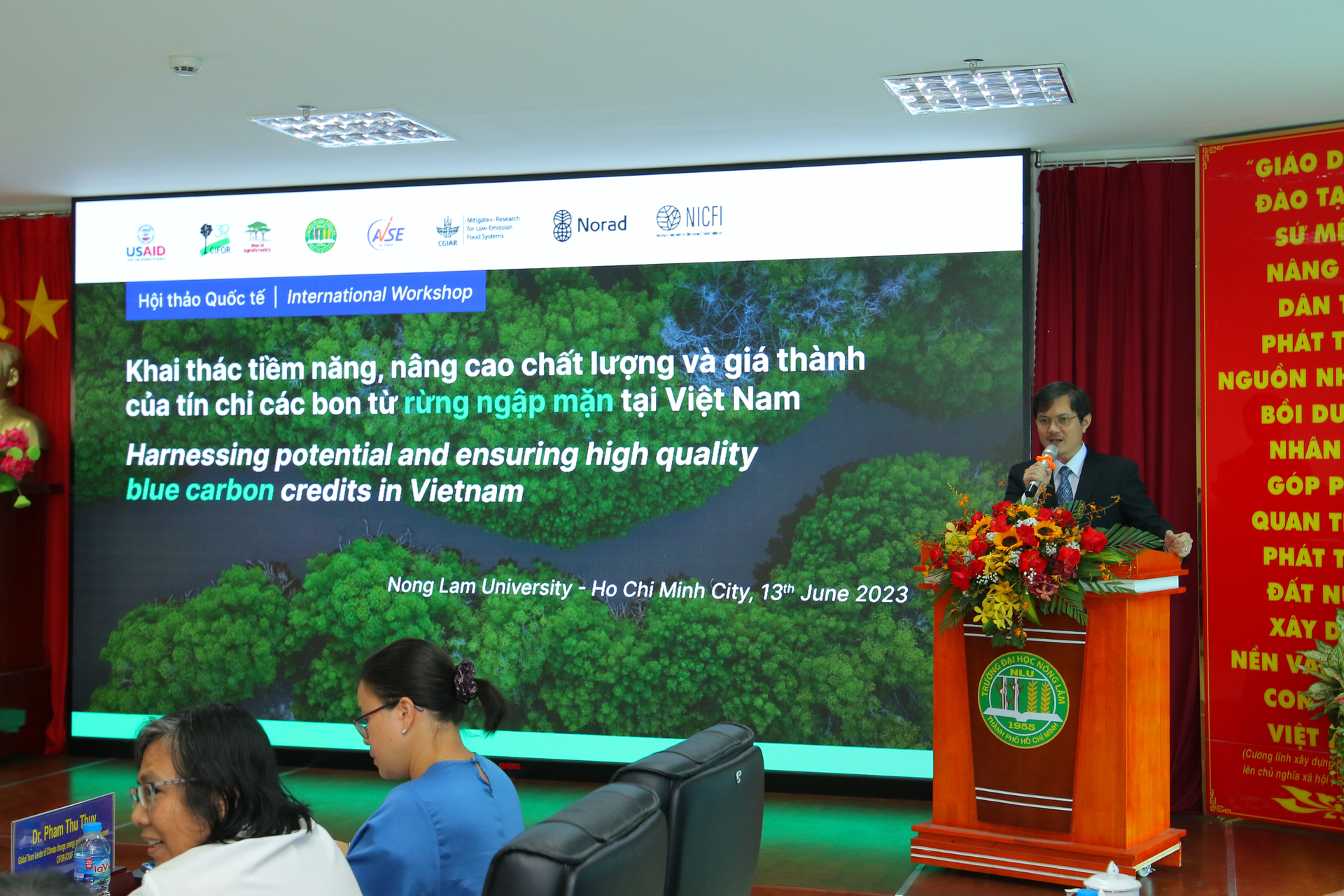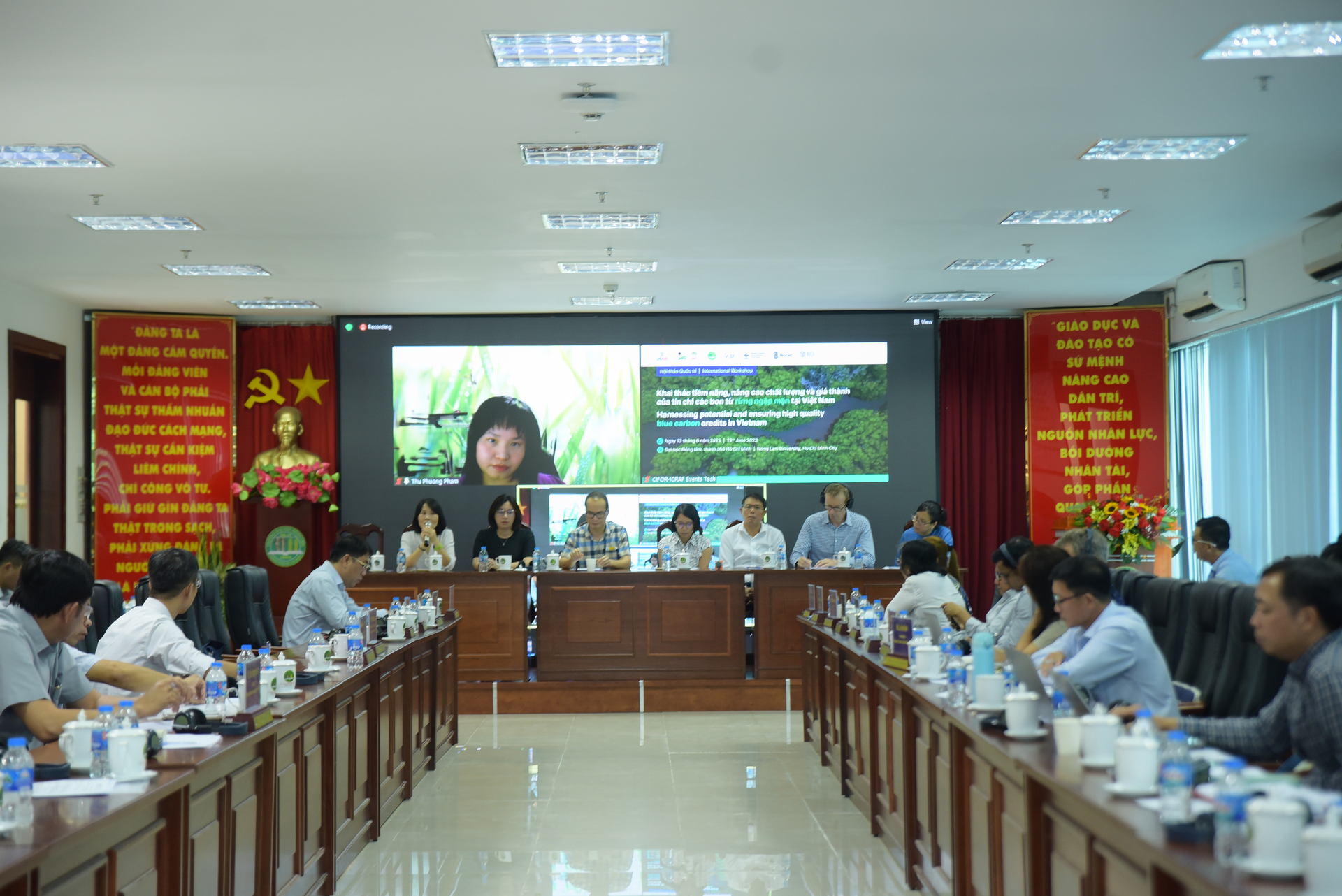November 23, 2025 | 04:53 GMT +7
November 23, 2025 | 04:53 GMT +7
Hotline: 0913.378.918
November 23, 2025 | 04:53 GMT +7
Hotline: 0913.378.918

The workshop “Harnessing Potential and Ensuring high-quality blue carbon credits in Vietnam” was held on June 13 in Ho Chi Minh City.
A workshop entitled “Harnessing potential and ensuring high-quality blue carbon credits in Vietnam” was co-organized by Nong Lam University – Ho Chi Minh City, the Center for International Forestry Research (CIFOR), and the Association of Vietnamese Scientists and Experts (AVSE) on June 13 in Ho Chi Minh City.
Attending the conference are leading scientists, experts, and researchers, both international and national, as well as Vietnamese representatives from the Ministry of Finance, the Ministry of Agriculture and Rural Development, the Ministry of Natural Resources, the Ministry of Planning and Investment, the Economic Consul (First Secretary) from Australian Consulate-General in Ho Chi Minh City, representatives of US Forest Service and Canadian Embassy in Vietnam.
Sharing with audiences at the conference, Mr. Dominique Balasuriya, Economic Consul (First Secretary) from Australian Consulate-General in Ho Chi Minh City, and Assoc. Prof. Nguyen Tat Toan, Vice President of the Agroforestry University (Nong Lam University) - Ho Chi Minh City, stressed that the protection of coastal ecosystems and mangroves is not only considered a priority of Vietnam but also of the global community. It is worth noting that when we want to participate in the forest carbon market in general and, in particular, the blue carbon market including mangroves, we must clearly understand the rules of the market. They also emphasized that complying with international regulations and domestic laws of Vietnam is a must.
Professor Daniel Murdiyarso (2007 Nobel Peace Prize), former Deputy Minister of Environment of Indonesia and now CIFOR-ICRAF’s principal scientist, shared that countries are now integrating coastal and ecosystems. mangrove ones into its regulations for their national policy. Therefore, although the development of a carbon market for coastal ecosystems and wetland ecosystems, including mangroves, is shaping globally, it should always comply with current national regulations.

The conference took place in the context of a global decline in both quantity and quality of mangroves due to pressures from socioeconomic development and severe financial shortages.
Dr. Pham Thu Thuy, senior scientist who leads the Climate Change, Energy and Low-Carbon Development team at CIFOR-ICRAF, emphasized that joining the mangrove carbon market will not only help Vietnam implement its policies for reducing emissions but can also create a competitive advantage for Vietnamese goods, including seafood products in the international market, as export markets are turning to ones that only circulate low-carbon emitting and environmentally-friendly products.
At the conference, the Ministry of Finance shared information on a national program on establishing a carbon market in Vietnam which has been undergone following conclusions of the Prime Minister of Vietnam during the third meeting of the National Steering Committee for implementation of Vietnam's commitments at COP26. Audiences also got updated by the Department of Climate Change, Ministry of Natural Resources and Environment, on global carbon market, on current regulations for the carbon market and on forest carbon market in Vietnam. Participants also listened to Vietnam Forest Protection and Development Fund (Ministry of Agriculture and Rural Development) sharing practical experiences while implementing forest carbon markets in the country, helping audiences to better understand opportunities and challenges in realizing and operating programs, projects and markets for forest and mangrove carbon in Vietnam.
The conference took place in the context of a global decline in both quantity and quality of mangroves due to pressures from socioeconomic development and severe financial shortages. Developing countries including Vietnam have developed mechanisms and policies to mobilize new financial sources for the protection and development of mangroves as an important policy to implement the Paris Agreement and the Glasgow Declaration on Forests and Land Use. In parallel with the improvement of public administration policies, investors are also looking for opportunities to expand the carbon market for mangroves. In recent times, an increasing number of investors have been looking to Vietnam for opportunities to buy mangrove carbon credits.
The conference helped providing a panoramic view for projects and programs on forest carbon in Vietnam, assisting policymakers and stakeholders in exchanging information, updating the international and Vietnamese legal framework, and enhancing market, technical and social requirements of the Mangrove Carbon Market. Besides, more than 200 participants also had chance to join a one and a half-day training course on June 14–15 for “Designing and implementing effective, equitable blue carbon policies and projects “, which was co-organized to support Vietnam and the 13 Mekong Delta provinces in designing and implementing effective mangrove carbon projects for gaining access to sustainable finance.
Translated by Linh Linh

(VAN) Official Telegram No. 226/CD-TTg, issued on November 21, 2025, mandates enhanced management and utilization of national reserves to support flood response and relief efforts in the Central Region.

(VAN) The Politburo has demanded a high concentration of efforts on urgent relief tasks, ensuring absolute prevention of hunger, cold, and shortages of clean water or medicine among the population.

(VAN) Water resources during the 2025–2026 dry season in the Mekong River Basin basically meet domestic use and production needs, but localized shortages may still occur due to saltwater intrusion.

(VAN) Vietnam and Japan have committed to deepening cooperation on projects under the Joint Crediting Mechanism (JCM), improving waste management, and advancing the circular economy.

(VAN) Digital transformation is becoming a core driver of proactive, precise, and safer management of dams and reservoirs nationwide.

(VAN) This assistance supports people who temporarily relocate or evacuate, as well as communities affected by major storms from late September to now.

(VAN) Viet Nam will host the 8th ASEAN Heritage Parks Conference, bringing together over 320 delegates and reaffirming its role in regional nature conservation.